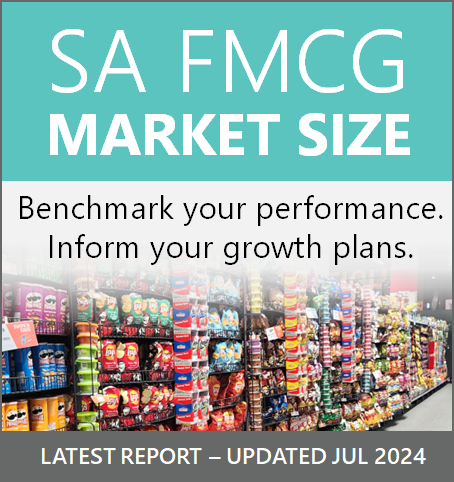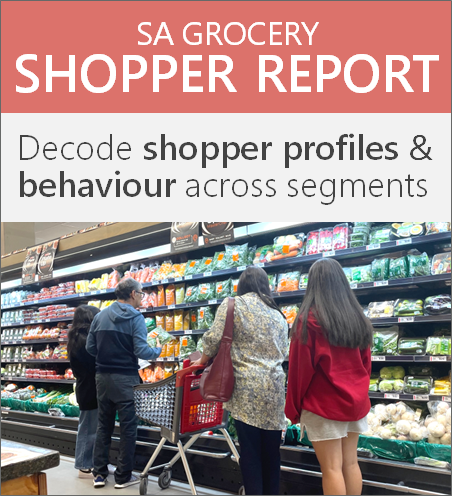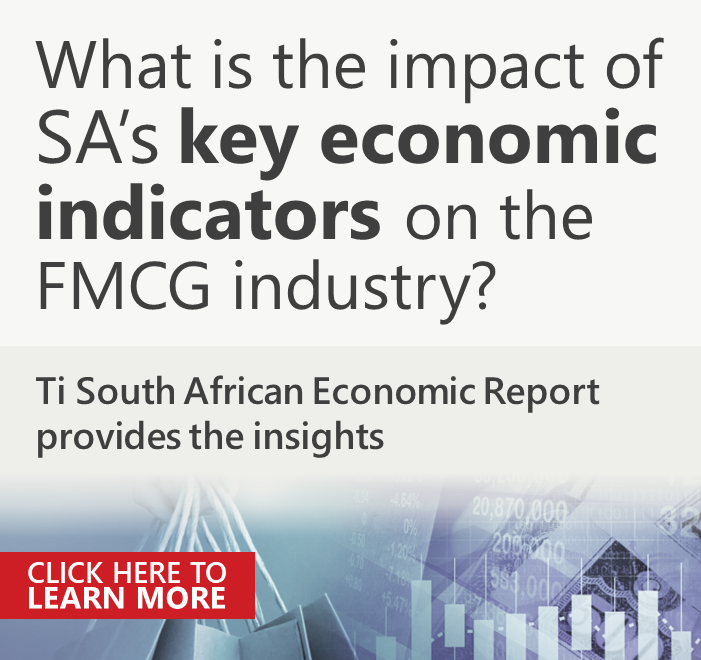
THIS ISSUE: 11 Mar - 17 Mar
Issues of the broader economy are much on our mind this week, as we digest last week’s GDP numbers, the unemployment figures, and the likelihood of food price increases resulting from the war in Ukraine. Our great industry has a particular role to play in improving the lives of South Africans, both as a major employer, and a provider of affordable to nutrition to embattled households – see Shoprite, below. And enjoy the read.
YOUR NUMBERS THIS WEEK
RETAILERS AND WHOLESALERS
-
Shoprite Coin of the realm
Shoprite has built its success, in part, on its reputation for providing value to South Africans across the economic spectrum. And it’s built this reputation by providing that value, then communicating it in novel and compelling ways. Take, for instance, its ongoing R5 campaign, which highlights the value the business provides by communicating what can be purchased in its stores for the increasingly embattled denomination. Like, in 2016, its subsidized 600g loaf of brown bread, still available at that price. And the R5 deli meals, launched in 2017 to provide nutritious, affordable, hot food, and of which over 228,000 were sold last year. The R5 packs of sanitary pads, launched in 2020, and since purchased by millions of South African women and girls. And – extending the offer to financial services – the flat R5 fee for Money Market withdrawals while everything else on the account is free. Putting all of this in context, it’s estimated that 2.5 million South Africans experience hunger every day.
Comment: The power of a R5 coin, and the power of a good idea, communicated consistently. Good work, The Big Red One. Our sincere hope is that the conflict in Ukraine will not severely jeopardise this noble initiative.
-
-
Pick n Pay State of independents
A dustup between Pick n Pay and some of its spaza owners highlights some of the challenges faced by small businesses and their backers in the current trading environment. At issue are insurance claims paid out after last year’s outbreak of unrest and looting: some owners have objected to their agreement with Pick n Pay for the retailer to receive its claim for goods provided before the rest of the payout was made to stores. Pick n Pay is not having it. “The Market Store owners remain independent traders. Most have seen their sales and profitability increase significantly as a result of their participation,” says spokesperson, Janine Caradonna. “Unfortunately, however, for different reasons, not every participant will succeed. In such an instance, we have detailed discussions with the respective owners to explore options available to both them and us.” The programme was originally a collab between Pick n Pay and the Gauteng Department of Economic Development; the MOU has since lapsed, although the Western Cape Department of Economic Development seems to have stepped in to pick up the slack.
Comment: There is always going to be some attrition among small businesses. Last year’s unrest accelerated its pace for some.
-
-
In Brief Trading spaces
Dis-Chem is adding to its primary healthcare portfolio with the development of health insurance products in partnership with health insurance outfit Kaelo and non-life provider Centriq Insurance. “People are prepared to pay for healthcare, and this product is in line with our intention and commitment to play a leading role to extend universal access to a wider and under-served segment of the population,” says Dis-Chem CFO Rui Morais. Now, more on the announcement by Woolworths that it will be cutting space in Fashion, Beauty and Home (FBH). In 2020, space occupied by this category totalled 440,000m2; they intend to cut this back to 382,000m2 by June 2023. However, the number of FBH stores will decline by half this rate, suggesting that space will either be returned to landlords or turned over to the more profitable Food category. A particular target for the old pruning shears will be Australian brand Country Road and the upmarket Studio W offering. The reduction of unproductive space – something of an obsession for still-new new CEO Roy Bagattini – has seen trading densities – or sales per square metre – growing by more than 10% in the past year.
Comment: The last, hard couple of years have exposed the weaknesses in South Africa’s retailers, allowing them a much-needed opportunity to trim back the dead wood in anticipation of better (or yet-leaner) times.
-
-
International Retailers Well, well, well…
Walmart is doubling down on its investment in wellness with the addition of two new services to its Wellness Hub. ‘BetterUp for Caregivers™’ offers online training and other support for America’s burgeoning population of caregivers – now 50 million and growing – and the ‘Easy Vitamin Plan’ offers subscribers a 28-day supply of vitamins that meets their specific needs at an everyday low price. Sticking with Walmart: in a novel way of broadening its online reach, every single one of its 1.6 million employees will be added to its Walmart+ home delivery subscription plan, which normally costs $98 a year. Over in dear old Blighty, supermarket-slash-maker-of-exploding-robots Ocado is scrapping its ‘best before’ labels on some of its Ocado ‘Own Range’ fruit and veg, to save thousands of tons of perfectly edible food from being thrown away. And back in the US and A, Ocado has won a patent fight against Autostore, enabling it to open for business on the more litigious side of the Atlantic.
Comment: A vast business of restless ambition, Walmart is delivering innovation on a seemingly weekly basis these days. Definitely worth taking a leaf or two out of their playbook.
MANUFACTURERS AND SERVICE PROVIDERS
-
Nestlé Hatching a plan
This week in News of the New, Nestlé has in partnership with COOi Studios recently launched the Nestlé Hatcher, a ground-breaking, open-innovation platform that will offer innovators and start-up businesses opportunities to work with the food manufacturing company to collaborate in solving some of the current business challenges across the East and Southern Africa Region. Through Hatcher, the dairy giant will work collaboratively with start-ups to identify sustainable and scalable solutions that help accelerate the innovation of products and services to meet local consumer needs, in specific areas in which Nestlé has an interest. For example, Hatcher’s Project Uno is aimed at helping Nescafé to further engage its youth market by providing digitally-driven solutions that offer customer experiences beyond the product, with a specific brief to explore loyalty and rewards programmes, emerging technologies, improved accessibility and digital solutions.
Comment: Excellent – exposure and resources for the little guy, creative firepower for Nestlé. What we in the industry call a ‘win-win’.
-
-
In Brief Juiced
A couple of bits of agency news for you. First up, M&C Saatchi Abel has been appointed as lead agency across a portfolio of PepsiCo brands, including, Lay’s, Liqui Fruit, and Weet-Bix. “We believe that the appointment of new agency partners will bring together creative talent with our winning brands to help us create meaningful connections between our brands, our consumers and their communities,” says Martin Neethling, Chief Marketing Officer for PepsiCo sub-Saharan Africa. And sticking with PepsiCo, a business that is capturing hearts, minds and wallets in our region, iconic Durban outfit The Hardy Boys has picked up juice brands Ceres, Fruitree, and Wild Island. “We look forward to all the fun that is yet to come with these epic and much-loved South African brands,” say the Boys. Unrelated, Investec has upped its stake in IMPERIAL Logistics, through a share acquisition by Investec Markets, and now holds 5.0864% of IMPERIAL stock, which as you know is about to be acquired in its entirety by DP World of Dubai.
Comment: Nice work those ad agencies, which will bring some new creative blood to PepsiCo’s dynamic stable of brands.
TRADE ENVIRONMENT
-
The Economy War: what is it good for?
Last week the hoary sages of Statistics South Africa released the GDP growth numbers for the annus slightly less horribillis that was 2021. The total haul was +4.9%, much of it due to the rebound off 2020’s extremely low base, and with an assist from the strong tailwinds of global post-COVID growth. But let’s not get too excited: it should have been much better, and might have, were it not for Eskom, the July riots, lockdown restrictions, and poor service delivery inter alia. The big performers for the year were personal services at +5.3%, trade, catering and accommodation at +6.0%, and mining and quarrying at +11.8%. The really bad news, however, is that the year’s recovery was a jobless one, with unemployment reaching a record level of 34.9% in Q3. In other news of the economy, South African businesses and consumers alike are bracing themselves for the economic fallout from Russia’s invasion of Ukraine. Between them, the countries produce 29% of global wheat exports, 19% of corn and 80% of sunflower oil; supply of all these is likely to be disrupted until hostilities cease and beyond. While food shortages seem unlikely this year, food prices will definitely rise
Comment: And for many South African families, there is no appreciable difference.
Sign up to receive the latest SA and international FMCG news weekly.
Tatler Archive
“Did you know that the worldwide food shortage that threatens up to five hundred million children could be alleviated at the cost of only one day, only one day, of modern warfare.”







1.png)
